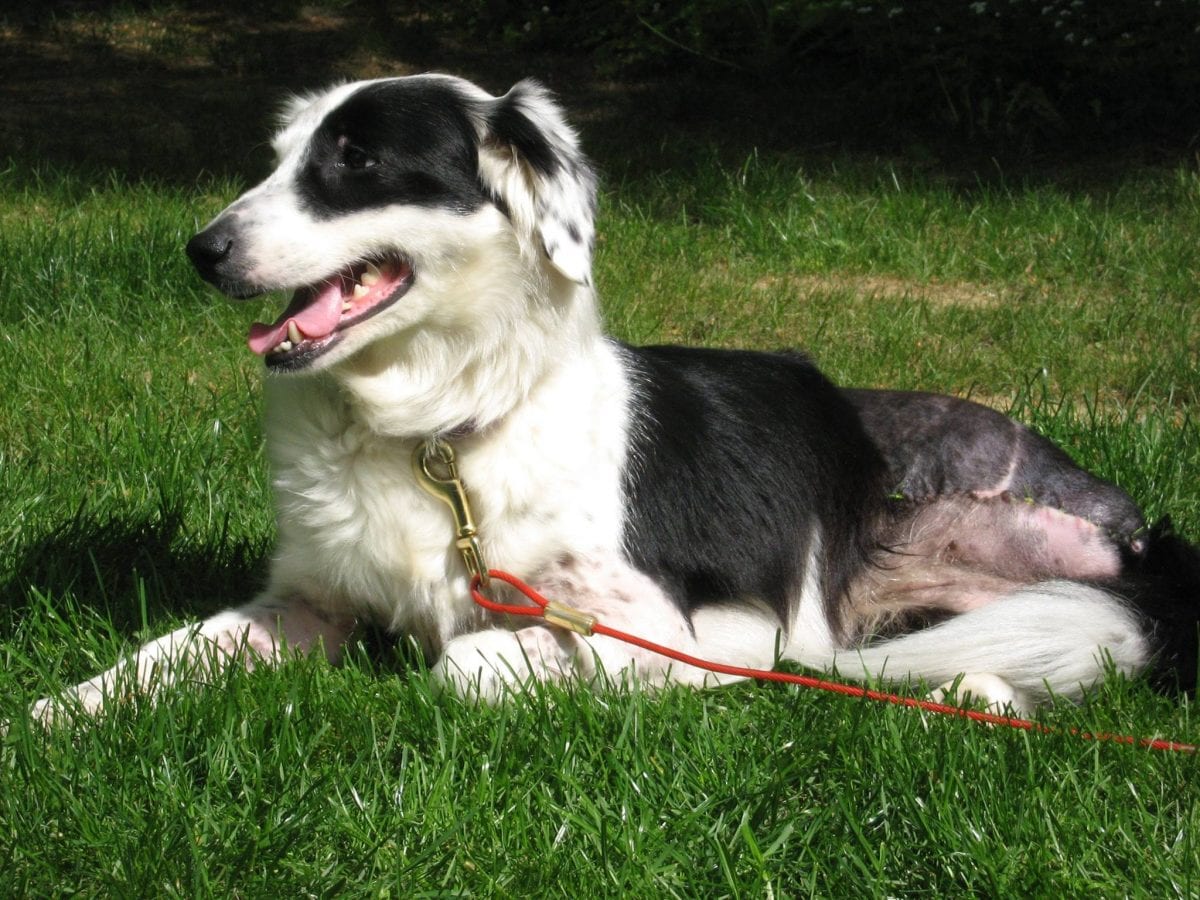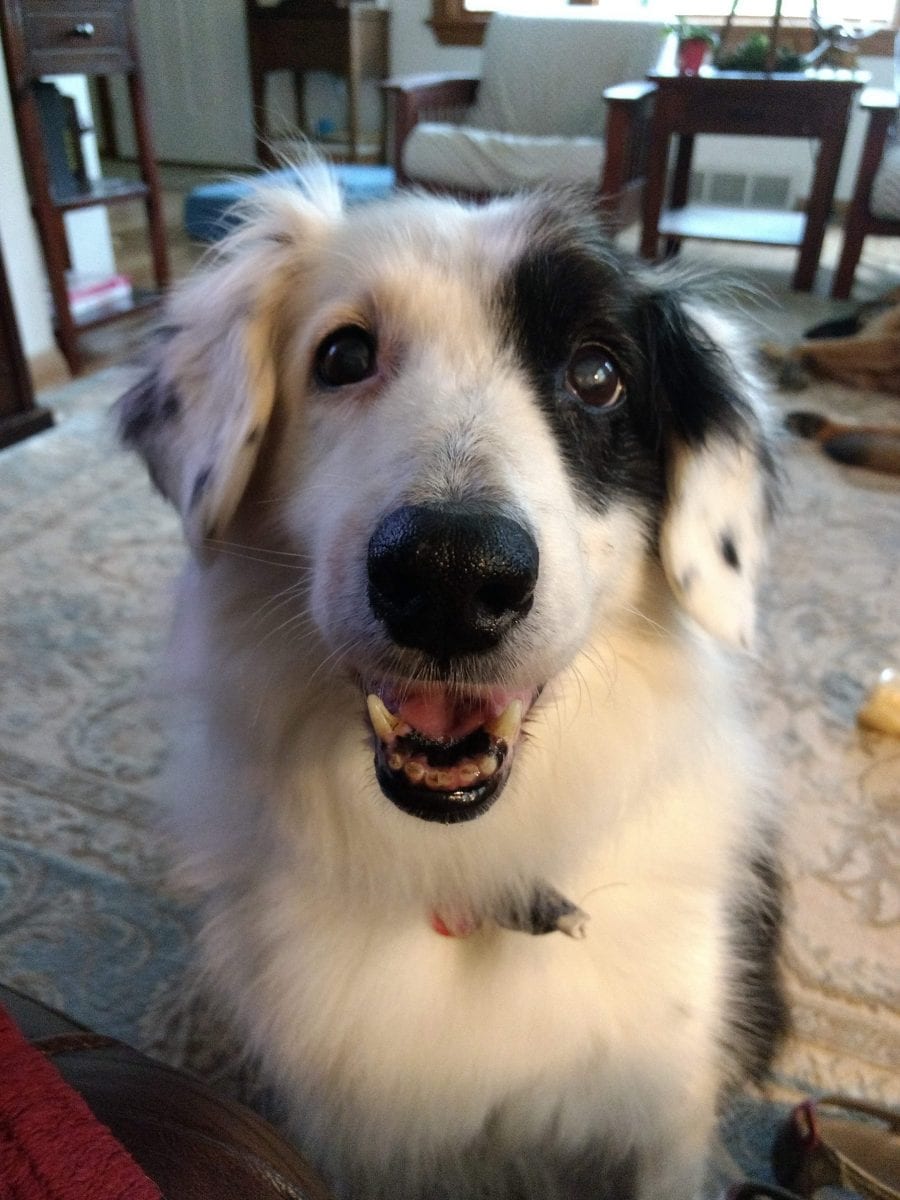We felt confident bringing home Hugo as a cute little fuzzball with a peg leg knowing that he would eventually become a Tripawd. Our sweet girl Xena provided us with that confidence. Xena came to our family under somewhat tragic circumstances. She was surrendered to the veterinary hospital where I worked with severe injuries to her left rear leg. Her owners were unable to provide care for her and elected to give her to the veterinarian on call that evening. She ended up requiring amputation to save her from a life-threatening infection and severe nerve damage.
Xena stayed with us as a temporary foster to help her heal away from the stressful hospital environment. After learning more about her past, my husband & I decided that she needed some stability in her life. Not surprisingly, Xena became our first Tripawd and our first “foster failure”. We knew this girl had some real tenacity to survive such a frightening injury and subsequent surgery with such stoicism. But what the doctors don’t necessarily tell you after a life-changing amputation surgery is that the dog’s mental status is just as important as their physical health status. 
Xena, 10 days post-op and her first day with us
Xena taught us so much about what it means to recover from amputation. While she was up and walking very quickly, she was often sedentary and very shy. Yes, recovery is learning how to walk again, and how to get up the stairs, and how to go potty again. But it’s more than the therapy, exercises, and wound healing. It’s finding internal strength too.
Training helps engage the brain as well as the body
Xena came to us with two challenges — she needed to heal mentally as well as physically. Much of Xena’s recovery involved building up her confidence. We worked hard on positive reinforcement training with her. I cannot say enough how much training helped with Xena’s (and eventually Hugo’s) recovery. We were able to build trust with her. Training also helped teach her coping skills for scary situations like thunderstorms, seeing other dogs, or kids on bikes.
Clicker training made therapy fun and rewarding, rather than some strange thing we were doing TO her. It helped her feel more relaxed so she could really engage in the work instead of being tense and afraid. We were able to build her confidence with brain games like food puzzles or keep her engaged despite having a sore day with a fun snuffle mat. Training helped her know what to expect from us, and she felt happier when she knew that she could do something to please us. She would wag her fluffy tail so fast when she heard that click!
Instead of just laying there watching TV while applying an ice pack, we could make that awkward situation fun by “loading” our clicker. This is an easy activity that a Tripawd can do (if she’s feeling well enough to eat) during the post-operative stage. All you have to do is click the clicker, and give your dog a small tasty snack! This teaches your pet that the “click!” sound means delicious things will happen. Later, we taught Xena how to sit and stand and walk on a leash using clicker training. When it was Hugo’s time, we were able to get through plenty of therapy exercises because it was fun instead of a chore.
Positive reinforcement is a confidence booster
Each dog’s recovery from amputation is so different. It’s scary no matter how many times you’ve been through it. I’ve guided plenty of pet owners through the amputation process and it always hits harder when it’s your own. What I’ve found in my personal and professional experience is that the patient’s attitude makes a difference in how fast they recover. Once the physical needs like pain management, nutrition, and wound healing are taken care of, reward-based training helps your dog stay engaged with the recovery process.
I can say that clicker training made a huge difference in boosting the confidence of our sweet little Xena to get her body and her soul on the road to recovery. Positive reinforcement training helped us be more prepared when it was time for Hugo’s surgery. I would encourage any owner whose pet is facing amputation to consider adding training to their recovery plan.

Xena lived for almost 11 amazing years with us. Her incredible turnaround from sad, damaged girl to a beautiful confident princess will last forever in our hearts.

BRAVO! Oh my gosh what sage words of wisdom, thank you for sharing Xena’s experience during recovery and beyond. You did such great things to help her be the hoppiest, most sparkling Tripawd girldog. Brain games rock! We so appreciate the tips, and will be sharing with the community!
What a very sweet story. Thanks for being great humans.